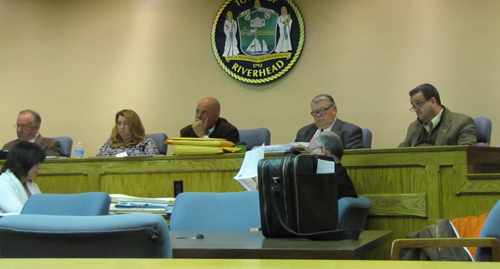Column: In defense of Danowski (the blame lies elsewhere)


Attorney Pete Danowski didn’t ask for my help. We’re not friends; we’re not enemies. I write neither to criticize, nor to praise, his behavior.
Discussion of Danowski’s role in Riverhead development is a huge distraction from the real problems. People often view him as the bad guy when things go wrong; I couldn’t disagree more. To me, he’s both predictable and irrelevant.
Every town has its Danowskis. If Pete left Riverhead tomorrow, others would rush to fill the void, cultivating relationships with people on planning and zoning boards and with staff in building and planning departments. (Yes, this makes for choppy ethical waters.)
Danowski’s job is to advocate for his clients’ interests, and he’s clearly good at it. Sadly, Riverhead taxpayers lack advocates of their own. Developers have deep pockets for hired guns to get permits and variances; concerned citizens typically can’t afford attorneys.
That would be OK if town staff and appointed board members were appropriately skeptical, recognizing that most things Danowski’s clients want are inherently not in the town’s best interest. But our representatives are far too deferential; they rarely mount a challenge.
At a recent ZBA hearing on Costco lighting, Danowski claimed fewer, taller poles would deliver improved aesthetics and fewer cars bumping into lights. The discussion was anecdotal and subjective, lacking any data on lighting performance. He didn’t offer, and no ZBA member asked about, lumen output, footcandle distribution, cutoff angles, glare, color temperature or efficiency — all things you’d want to know to make an educated decision on a lighting code variance (or, if you live next door).
Why didn’t these facts matter? Is anyone gullible enough to believe the developer’s goal is improved aesthetics, or that light pole accidents are a real problem? And why did no one ask the obvious: How much money would the builder save by eliminating two-thirds of the poles?
Danowski said gas pump lights need to be brighter “for security;” ZBA members didn’t ask how other stations manage with lights that comply with code and “dark skies” rules. He also said, “LED lights are brighter,” which is simply false; LED fixtures can deliver any desired lighting level.
The same process played out with far greater consequences when Danowski argued that his client would be doing the town a favor by clearing the entire Costco site. No one objectively reviewed the pros and cons of this proposal or did any sort of cost-benefit analysis. The Planning Board was quick to accept the developer’s assertions that less truck traffic during construction was worth losing 11 acres of forest, forever. Planning Board chairman Richard O’Dea apparently believed the developer’s stated reason: “We don’t want to disturb the neighbors twice.” Really?
Separately, in addition to saving the developer millions, this decision cost the town $374,000 in fees on imported fill. Why is that OK? Why did Planning Board members and staff fail to mention it?
Still worse is the brazen way in which Town Board members are laying blame elsewhere. Sean Walter said: “I am very unhappy that these shopping centers clear-cut these sites, and I’m a little surprised that the Planning Board let them do it.” That remark alone should cost him the election.
It’s a “fail” on two levels. First, the Town Board handpicks Planning Board members; by their appointments, they bear major responsibility for clear-cutting. Further, as Walter once said: “In my world, we’re the elected officials, but when we ask the Planning Board to do something, we sort of expect them to do it, because we’re the ones people vote in.”
There have been warnings about the dangers of packing boards with cronies who are unqualified and/or have political agendas. (See here and here.)
With the Costco actions and many more, we now reap what Town Board members have sown.
Second, no Town Board member has apologized for issuing a land clearing permit, without which the developer couldn’t take the “wood” out of Foxwood. That vote was 4-0, and one council member was quite enthused: “We waited a long time and I vote yes.”
That the permit was issued two weeks before the Planning Board “findings” vote makes it even more disturbing that Town Board members blame others for the excess clear-cutting.
Their recently proposed new tree-saving law is as ludicrous as it is transparent. In trying to divert attention from the Costco debacle they caused, Town Board members ignore the fact that zoning and planning boards could neuter any such law, one project at a time.
A hero in this mess deserves to be recognized. Planning Board member Joe Baier voted “no,” and for the right reasons: He saw clear-cutting 11 acres with no plan to build anything as a raw deal. We desperately need more planning and zoning board members inclined to objective analysis and independent thought.
No incumbent Town Board member is likely to make such appointments. Voters should remember that these zoning and planning choices have a more profound impact on Riverhead’s future than anything else our elected officials do. This November, the odds are high that any candidate not presently serving on the Town Board will improve it.
Larry Simms owns a home in South Jamesport, is a principal in a firm that licenses commercial flooring technology and is active in savemainroad.org, an advocacy group dedicated to preserving the character of the Main Road corridor and surrounding areas.








